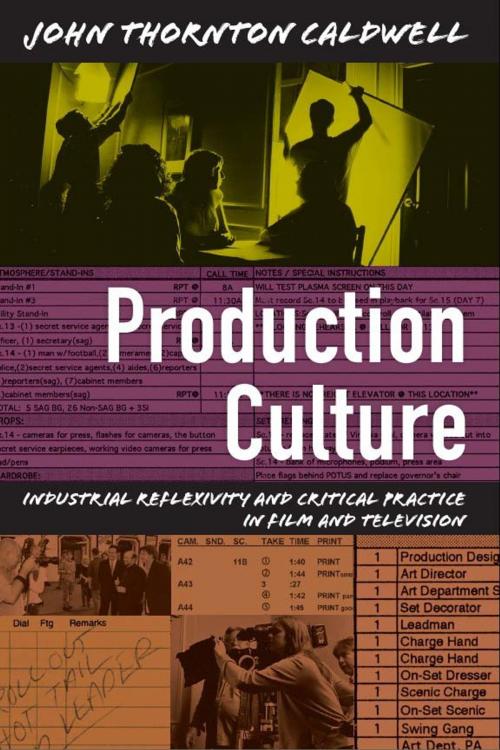Production Culture
Industrial Reflexivity and Critical Practice in Film and Television
Nonfiction, Entertainment, Film, History & Criticism, Performing Arts| Author: | John Thornton Caldwell, Lynn Spigel | ISBN: | 9780822388968 |
| Publisher: | Duke University Press | Publication: | March 25, 2008 |
| Imprint: | Duke University Press Books | Language: | English |
| Author: | John Thornton Caldwell, Lynn Spigel |
| ISBN: | 9780822388968 |
| Publisher: | Duke University Press |
| Publication: | March 25, 2008 |
| Imprint: | Duke University Press Books |
| Language: | English |
In Production Culture, John Thornton Caldwell investigates the cultural practices and belief systems of Los Angeles–based film and video production workers: not only those in prestigious positions such as producers and directors but also many “below-the-line” laborers, including gaffers, editors, and camera operators. Caldwell analyzes the narratives and rituals through which workers make sense of their labor and critique the film and TV industry as well as the culture writ large. As a self-reflexive industry, Hollywood constantly exposes itself and its production processes to the public; workers’ ideas about the industry are embedded in their daily practices and the media they create. Caldwell suggests ways that scholars might learn from the industry’s habitual self-scrutiny.
Drawing on interviews, observations of sets and workplaces, and analyses of TV shows, industry documents, economic data, and promotional materials, Caldwell shows how film and video workers function in a transformed, post-network industry. He chronicles how workers have responded to changes including media convergence, labor outsourcing, increasingly unstable labor and business relations, new production technologies, corporate conglomeration, and the proliferation of user-generated content. He explores new struggles over “authorship” within collective creative endeavors, the way that branding and syndication have become central business strategies for networks, and the “viral” use of industrial self-reflexivity to motivate consumers through DVD bonus tracks, behind-the-scenes documentaries, and “making-ofs.” A significant, on-the-ground analysis of an industry in flux, Production Culture offers new ways of thinking about media production as a cultural activity.
In Production Culture, John Thornton Caldwell investigates the cultural practices and belief systems of Los Angeles–based film and video production workers: not only those in prestigious positions such as producers and directors but also many “below-the-line” laborers, including gaffers, editors, and camera operators. Caldwell analyzes the narratives and rituals through which workers make sense of their labor and critique the film and TV industry as well as the culture writ large. As a self-reflexive industry, Hollywood constantly exposes itself and its production processes to the public; workers’ ideas about the industry are embedded in their daily practices and the media they create. Caldwell suggests ways that scholars might learn from the industry’s habitual self-scrutiny.
Drawing on interviews, observations of sets and workplaces, and analyses of TV shows, industry documents, economic data, and promotional materials, Caldwell shows how film and video workers function in a transformed, post-network industry. He chronicles how workers have responded to changes including media convergence, labor outsourcing, increasingly unstable labor and business relations, new production technologies, corporate conglomeration, and the proliferation of user-generated content. He explores new struggles over “authorship” within collective creative endeavors, the way that branding and syndication have become central business strategies for networks, and the “viral” use of industrial self-reflexivity to motivate consumers through DVD bonus tracks, behind-the-scenes documentaries, and “making-ofs.” A significant, on-the-ground analysis of an industry in flux, Production Culture offers new ways of thinking about media production as a cultural activity.















